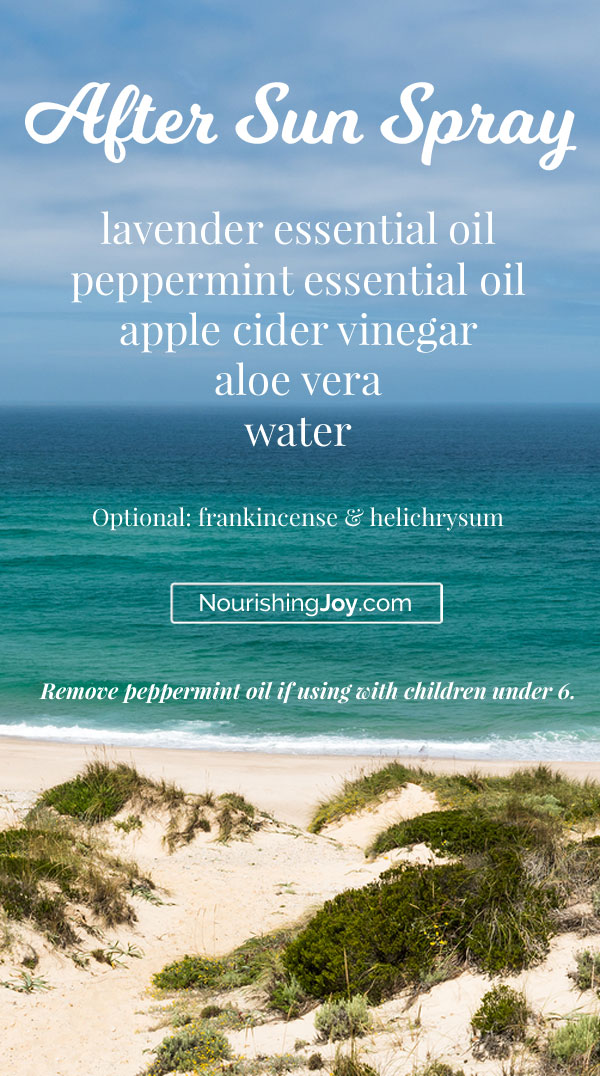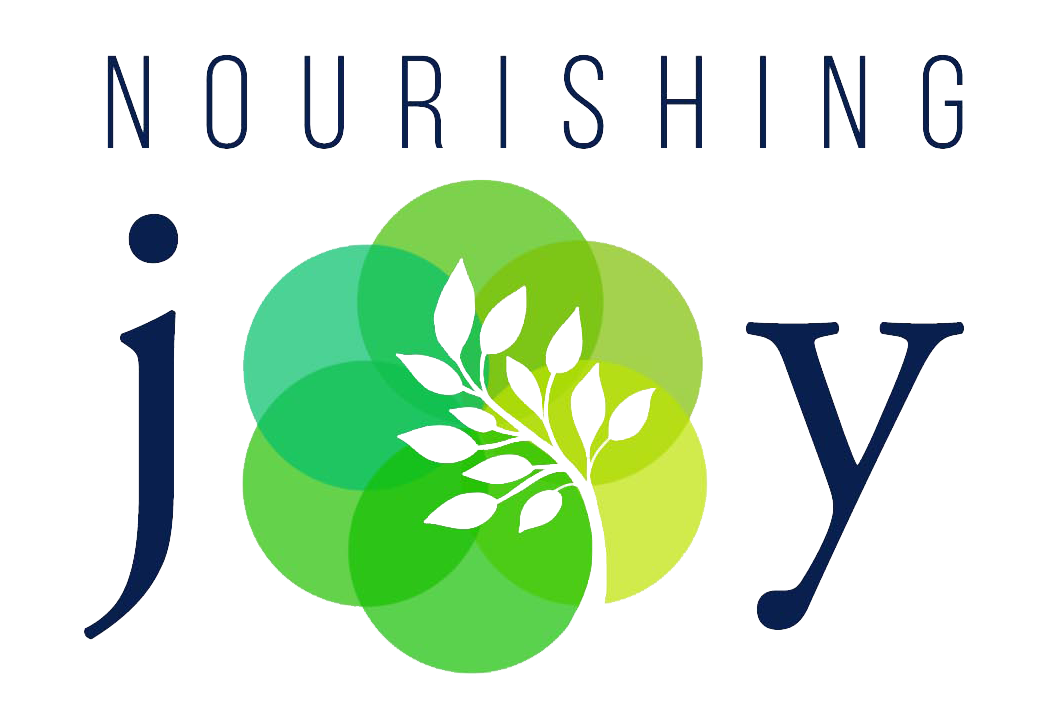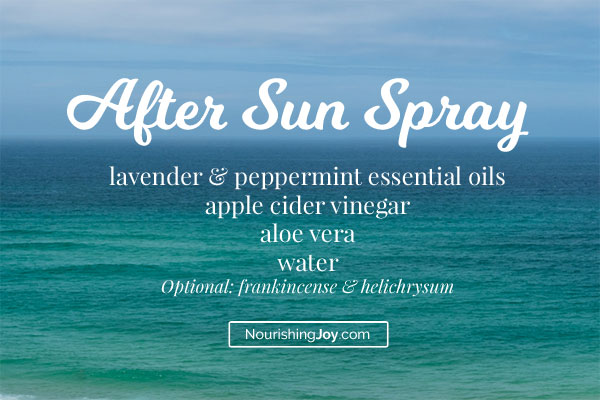After Sun Spray
This post may contain affiliate links, including those from Amazon.com, which means we earn a small commission off your purchases. And here's the thing: We only mention services and products that we think are truly worth your attention, whether they're free, paid, or otherwise. This site relies on YOUR trust, so if we don't stand behind a product 110%, it's not mentioned. Period.



Ah… sweet relief!
Summer is a delightful time for enjoying the outdoors, but it's all too easy to get just a little too much sun.
So, if your skin is feeling the effects of too much sun exposure or you have a mild sunburn, this is a super-lovely remedy to help your skin rehydrate and heal well.
And not only does this spray help you feel relief, but it actually helps cool the skin and helps it heal, which is important – for three reasons:
1. When your skin burns, the cells on the outer layers of your skin literally get “fried” and they're sort of misshapen and sluggish. And while the body does a decent job of repairing those cells, these “refurbished” cells can eventually lead to mistakes in cell regeneration, and those erroneous cells are what eventually give rise to skin cancer as they multiply.
2. When your skin is over-exposed to sun, it retains heat. So while it feels great to cool your skin down, helping the heat actually escape from your skin helps ensure that the heat doesn't continue to damage the skin, both at the surface and in the deeper layers. I described this more in my post on homemade burn cream, but here in this recipe, the peppermint essential oil, the vinegar, and the aloe vera are all cooling agents and actively help the skin release trapped heat. Oh, so wonderful!
3. This spray doesn't include any ointments or substances that can clog pores, which is important, as again – there needs to be room for heat to leave the body. Many over-the-counter after-sun creams actually do damage this way, even when they contain lovely soothing ingredients, merely because they effectively clog the pores after being rubbed in.
Important note: This recipe contains peppermint essential oil. Peppermint essential oil shouldn't be used with children under the age of 6, as there is a slight chance that it can cause seizures or sudden apnea in young children when it is inhaled. Just leave it out if making the spray to use with young children.
So, let's take a quick look at the recipe and then at each ingredient and why I've included it in the formulation.
After Sun Spray
Ingredients:
20 drops lavender essential oil
20 drops peppermint essential oil
2 tablespoons apple cider vinegar
2 tablespoons aloe vera gel or juice
3 tablespoons water
If desired, add:
5 drops frankincense essential oil
3 drops helichrysum essential oil
Method:
Place all ingredients except for water in a 4 oz spray bottle. Shake well, then add water and shake again gently until homogenous.
To apply, spray 6-8 inches from the skin, covering as much or as little of the body as desired.
Store for up to six months in the refrigerator. Keep chilled to help with cooling effect. Shake gently before each use.
Note:
The amount of essential oils in this recipe is intentional, but you are welcome to increase it or decrease it as desired. For healing purposes, I chose a 2% solution, and thus by following the essential oil dilution chart in our How to Use Essential Oils Safely printable, you may note that we want approximately 48 drops of essential oils since this recipe totals about 120 mL in volume. If you'd like to increase it to 3% or reduce it for use on children, the chart has those figures at-a-glance.
Know Your Ingredients
This after-sun spray is very basic!
Lavender essential oil is known for providing soothing relief and for all-things-skin repair. It has been used for thousands of years as a skin ointment due to it antimicrobial properties and its ability to speed the healing of burns, cuts, scrapes, and wounds. It is one of the few oils that is generally acceptable to apply “neat” (meaning, you don't have to mix it with a carrier oil first), so in this recipe, you are free to over-do the lavender oil if you feel it's necessary.
Peppermint essential oil is included for its cooling effect. However, if you will be using the spray on children under 6, it's recommended that you leave the peppermint essential oil out. You can merely remove it or replace it with an equal amount of additional lavender essential oil.
Frankincense essential oil protects skin cells and promotes regeneration. Along with lavender, it's also known for helping promote a calm mind, which if you've had a hard day of play or are in pain from the sun exposure, any assistance in helping to unwind is most welcome!
Helichrysum is the #1 first aid essential oil and helps speed skin and wound healing. If you have this oil in your arsenal, definitely include it! Please note: helichrysum works best when it's in the presence of other oils, so even just the few drops that are called for here are enough to bring its potency to the fore. Be careful to not over-add any helichrysum.
As for the apple cider vinegar, there is documented anecdotal evidence dating back as far as ancient Egypt that burns heal more quickly when washed with vinegar, yet there aren’t any studies specifically linked to WHY vinegar speeds healing of minor burns. In our own home, I've noticed dozens of times that when my husband or I have unintentionally been out in the sun longer than we intended and our skin is just starting to turn red, if I rub the area with a cotton ball soaked in vinegar, within an hour the redness has turned completely brown with no pink whatsoever. Completely anecdotal, but it has worked for years in our house for stopping the burning action in the skin after sun exposure.
So while there are no studies showing WHY this is, there are a veritable landslide of modern studies that show vinegar's antiviral, antiseptic, anti-aging, and healing capabilities. Even L’Oreal submitted a patent back in 1995 for the use of vinegar in their anti-aging creams, citing a number of known studies. It is purported that the weak acetic acid in vinegar balances the damaged skin’s pH, which accelerates healing and skin regeneration, thereby also reducing scar tissue. By the way, if you don't have apple cider vinegar, plain white vinegar will do as well.
Last, but not least, aloe vera is a sunburn's best friend. Not only is it cooling, but it is a proven anti-inflammatory, promotes cell rejuvenation, and just feels great. It also contains salicylic acid (the compound that aspirin is based on), which offers pain relief. Which, of course, is absolutely lovely.
So, there's our all-natural After Sun Spray. Now get out there and enjoy the summer!




